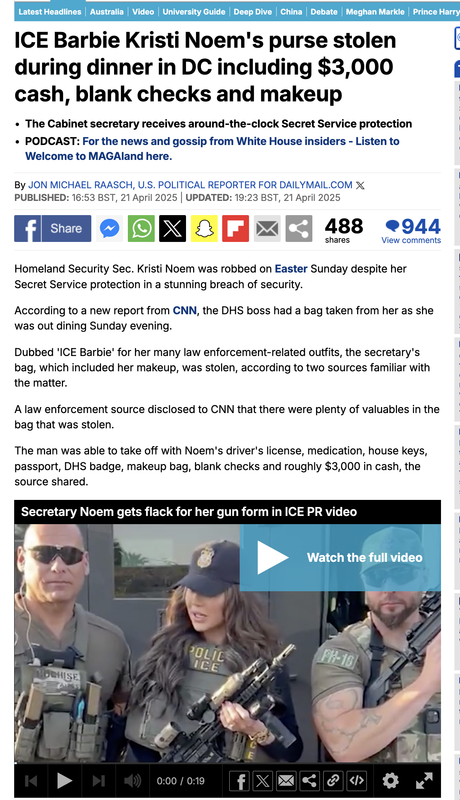尴尬了,国土安全部的ICE Barbie部长在DC钱包被偷,药、护照、办公室钥匙和证件全丢了
版主: kazaawang, wh
#23 Re: 尴尬了,国土安全部的ICE Barbie部长在DC钱包被偷,常吃的摇头丸,用来逃跑的护照,办公室钥匙和证件全丢了
自信一点,他家是sd的老钱,他那个农场价值几十个M
If printing money would end poverty, printing diplomas would end stupidity.
-
Zephyrca
- 论坛支柱

2024年度优秀版主
Zephyrca 的博客 - 帖子互动: 1282
- 帖子: 11572
- 注册时间: 2022年 8月 12日 22:10
#26 Re: 尴尬了,国土安全部的ICE Barbie部长在DC钱包被偷,常吃的摇头丸,用来逃跑的护照,办公室钥匙和证件全丢了
应该把不实之处修改删除
You see in this world there's two kinds of people, my friend. Those with loaded guns and those who dig.
#33 Re: 尴尬了,国土安全部的ICE Barbie部长在DC钱包被偷,药、护照、办公室钥匙和证件全丢了
@rida dari:If she can’t secure her own purse why are we trusting her to secure the country
#34 Re: 尴尬了,国土安全部的ICE Barbie部长在DC钱包被偷,常吃的摇头丸,用来逃跑的护照,办公室钥匙和证件全丢了
你们懂个p,他们这种身份私人付账都是用cash的,不然的话别人可以trace他们的行动轨迹。
drifter 写了: 2025年 4月 21日 20:47 Carrying $3,000 in cash in the U.S. is unusual due to the prevalence of digital payments and the risks associated with carrying large sums. Here are some types of people who might do so, based on reasonable patterns:
Small Business Owners or Cash-Based Workers: People running cash-heavy businesses (e.g., food trucks, market vendors, or independent contractors like handymen) may carry large amounts for transactions or deposits. For example, a restaurant owner might have cash from a busy weekend.
Individuals in Cash-Centric Communities: Some cultural or immigrant communities prefer cash for daily transactions, like in certain ethnic enclaves where businesses favor cash payments. They might carry significant amounts for convenience or distrust of banks.
Wealthy Individuals or High Spenders: Affluent people might carry large sums for spontaneous purchases (e.g., luxury goods, auctions, or tipping generously). Though less common, some prefer cash for privacy or status.
People Avoiding Digital Transactions: Those distrustful of banks, concerned about privacy, or evading financial tracking (e.g., tax evaders or individuals with legal concerns) might carry cash. This could include "preppers" or those skeptical of digital systems.
Travelers or One-Time Situations: Someone preparing for a trip, a major cash-only purchase (e.g., a used car from a private seller), or an event (e.g., a wedding vendor payment) might temporarily carry $3,000.
Criminals or Illicit Actors: While not typical, those involved in illegal activities (e.g., drug trafficking or money laundering) often use cash to avoid traceable transactions. This is a small but notable group.
Context and Risks:
Carrying $3,000 isn’t illegal, but it’s risky due to theft, loss, or civil asset forfeiture (where police can seize large cash amounts if they suspect wrongdoing, even without charges).
Most Americans carry far less—surveys suggest the average is $50-$100 in cash.
Businesses report cash payments are declining, with only 16% of U.S. transactions in 2023 being cash-based (per Federal Reserve data).
Demographics: No single "type" dominates, but it could include older individuals (less tech-savvy), rural residents (fewer digital payment options), or urban dwellers in cash-heavy economies. Men are slightly more likely than women to carry larger sums, per consumer studies.
If you have a specific context (e.g., urban vs. rural, age group), I can refine this further.
If printing money would end poverty, printing diplomas would end stupidity.
#37 Re: 尴尬了,国土安全部的ICE Barbie部长在DC钱包被偷,常吃的摇头丸,用来逃跑的护照,办公室钥匙和证件全丢了
做人不能光明坦荡一点吗
知道很多人的居住环境以后 我终于明白为啥会有这些想法了




